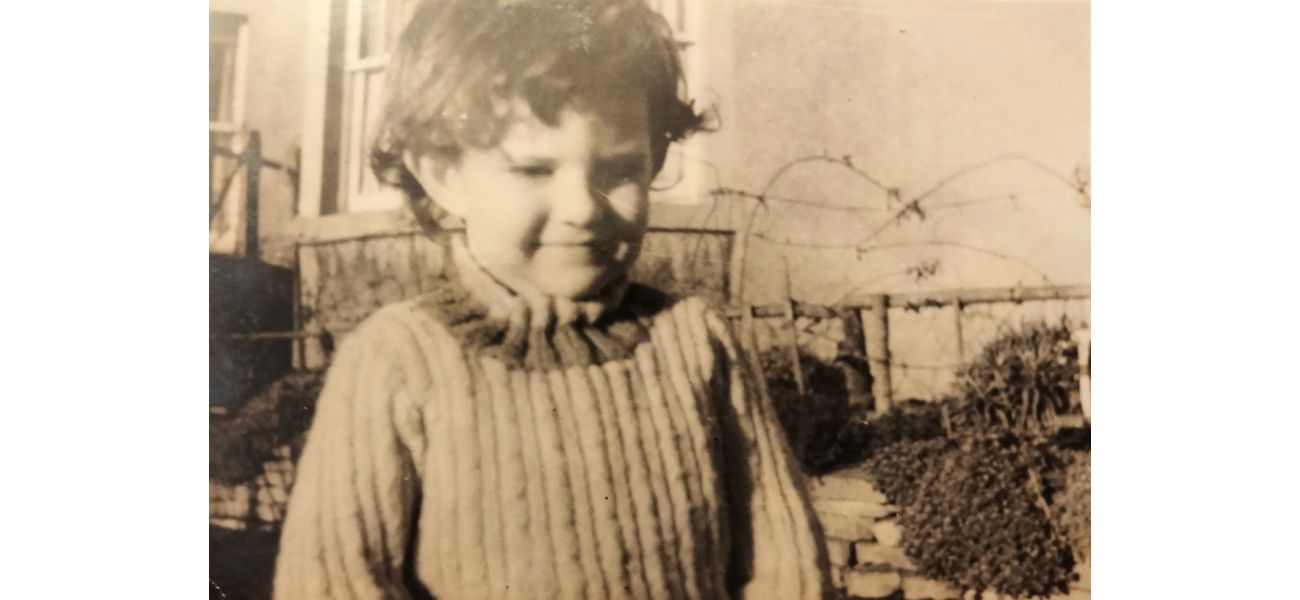My childhood memories are mostly from living in a prisoner of war camp.
Jenny endured hunger in two WW2 prisons.
October 21st 2024.

Jenny Martin, now 82 years old, sits in her grandmother's garden in Edinburgh, wearing a cozy jumper donated by the Red Cross. As she looks around at the blooming flowers and green foliage, her mind drifts back to a distant memory from her childhood.
She remembers a fence, tall and imposing, that loomed over her small frame as she walked alongside armed guards. She was just two years old at the time, and had no concept of what lay beyond that barrier.
"It's a simple memory," Jenny reminisces, "but it's stayed with me all these years. That fence seemed enormous to me, and I had no idea what was on the other side."
Jenny was born in Changi, a prisoner-of-war camp in Singapore, during the Second World War. She and her mother, Daphne, lived in a small wooden hut and struggled to survive on just one pound of rice per month.
"I thought it was normal to be hungry," Jenny recalls. "I was too young to understand the gravity of the situation. But for the adults, it was much harder. They were used to a better lifestyle, but the war had taken everything away."
The fall of Singapore in 1942 marked a dark chapter in British military history. Within a matter of weeks, thousands of people were rounded up and forced into prisoner-of-war camps across the Far East. Among them were Daphne Davidson, a Singapore-born secretary, and her husband James, an electrical engineer from Inverness.
As tensions rose and war seemed imminent, Daphne was tasked with burning sensitive government files that the Japanese should not see. Meanwhile, James was sent to work on a remote Japanese island. When the invasion of Singapore began on February 15, 1942, Daphne was taken to Changi camp, while James was sent to another location.
Amidst the chaos and destruction, Jenny was born on July 31, 1942. Her mother had been granted temporary leave from the camp to give birth in a hospital. But just two weeks later, mother and baby were sent back to Changi, where Jenny spent her early years in the care of her mother and the other prisoners.
"When I was two, we were moved to Sime Road," Jenny explains. "I remember living in Block E with around 1,000 other women. The guards would patrol the area, and I remember feeling scared of them and their guns. But the women in the camp were like a second family to me. They would sing me nursery rhymes, teach me my ABCs, and give me cuddles. I think having a baby around was a welcome distraction for them."
Jenny's father, James, was only able to visit his wife and daughter once during their time in the camp. He brought with him a small wooden rattle that he had made for Jenny. Today, that rattle is on display at the British Red Cross museum in London as part of the "Caught in Conflict: 75 years of the Geneva Conventions" exhibition.
One of Jenny's most vivid memories is the day the war finally ended. On July 31, 1945, as she celebrated her third birthday, the ground began to shake and a low rumble echoed through the camp.
"I remember everyone jumping out of their bunks and running outside to see what was happening," Jenny recalls. "Suddenly, we saw these massive planes flying low over us. The adults recognized them as RAF planes because of the markings. And then we found out that we were finally free. The planes dropped leaflets that said 'The war has ended, Japan has surrendered, we are coming for you very soon!' The women were crying and thanking God. That was the first time I heard the name of God, and I've been devoted to Him ever since. I will never forget that day."
Jenny Martin, now 82 years old, sits in her grandmother's garden in Edinburgh, Scotland. She is wearing a cozy jumper, donated by the Red Cross. But this peaceful moment in her life is a far cry from her earliest memory, which dates back to when she was just two years old. She recalls a huge fence, towering over her small frame, with armed guards patrolling behind her. It was a simple memory, but one that would stay with her for a lifetime.
As Jenny explains to Metro, she had no idea what lay beyond that fence. She was born in Changi, a prisoner-of-war camp in Singapore, during the Second World War. Her mother, Daphne, and her father, James, were both held captive there. Jenny and her mother lived in a wooden hut and were given only one pound of rice per month. To Jenny, it seemed normal to be hungry, as she had never known any other way of life.
But the fall of Singapore marked a dark period in British military history. Thousands of people, including Daphne and James, were rounded up and sent to various prisoner-of-war camps across the Far East. Daphne was a secretary for the Singapore Civil Service, while James was an electrical engineer from Inverness. When the radio announced the war, Daphne was tasked with burning sensitive files to prevent them from falling into Japanese hands.
As the Japanese invaded Singapore on February 15, 1942, James was sent to work on a remote island, while Daphne, who was pregnant with Jenny, was taken to Changi POW camp. Jenny was born on July 31, when Daphne was briefly allowed to leave the camp for a hospital. Two weeks later, they were back at Changi, where Jenny spent her early years under the care of her mother and the other POWs.
Jenny and her family were finally reunited when she was two years old, and they were moved to Sime Road camp. Here, Jenny lived in Block E with around 1,000 women. She remembers feeling a sense of fear when she saw the guards with their guns, but the women in the camp were always eager to comfort her and teach her new things. Jenny believes that having a baby in the camp was a welcome distraction for the women.
During her time in captivity, Jenny only saw her father once. He was allowed to visit them at Changi during Easter in 1943. He brought with him a small wooden rattle, which is now on display at a museum in London. Daphne gave James their only photograph together, which he kept in his pocket until the end of the war.
One of Jenny's most vivid memories is the day they were liberated. On July 31, 1945, the earth shook and a low rumble passed through the camp. Everyone rushed outside to see what was happening. Jenny recalls seeing huge planes with RAF markings flying low over them. It was then that they learned the war had ended and Japan had surrendered. The planes dropped leaflets announcing their freedom, and the women were overjoyed. It was on this day that Jenny first learned the name of God and has been devoted to him ever since.
As she sits in her grandmother's garden, Jenny reflects on her past and the struggles she endured during her early years. But she also remembers the moments of kindness and resilience that she witnessed in the face of adversity. Her story is a testament to the human spirit and a reminder of the enduring power of hope and faith.
She remembers a fence, tall and imposing, that loomed over her small frame as she walked alongside armed guards. She was just two years old at the time, and had no concept of what lay beyond that barrier.
"It's a simple memory," Jenny reminisces, "but it's stayed with me all these years. That fence seemed enormous to me, and I had no idea what was on the other side."
Jenny was born in Changi, a prisoner-of-war camp in Singapore, during the Second World War. She and her mother, Daphne, lived in a small wooden hut and struggled to survive on just one pound of rice per month.
"I thought it was normal to be hungry," Jenny recalls. "I was too young to understand the gravity of the situation. But for the adults, it was much harder. They were used to a better lifestyle, but the war had taken everything away."
The fall of Singapore in 1942 marked a dark chapter in British military history. Within a matter of weeks, thousands of people were rounded up and forced into prisoner-of-war camps across the Far East. Among them were Daphne Davidson, a Singapore-born secretary, and her husband James, an electrical engineer from Inverness.
As tensions rose and war seemed imminent, Daphne was tasked with burning sensitive government files that the Japanese should not see. Meanwhile, James was sent to work on a remote Japanese island. When the invasion of Singapore began on February 15, 1942, Daphne was taken to Changi camp, while James was sent to another location.
Amidst the chaos and destruction, Jenny was born on July 31, 1942. Her mother had been granted temporary leave from the camp to give birth in a hospital. But just two weeks later, mother and baby were sent back to Changi, where Jenny spent her early years in the care of her mother and the other prisoners.
"When I was two, we were moved to Sime Road," Jenny explains. "I remember living in Block E with around 1,000 other women. The guards would patrol the area, and I remember feeling scared of them and their guns. But the women in the camp were like a second family to me. They would sing me nursery rhymes, teach me my ABCs, and give me cuddles. I think having a baby around was a welcome distraction for them."
Jenny's father, James, was only able to visit his wife and daughter once during their time in the camp. He brought with him a small wooden rattle that he had made for Jenny. Today, that rattle is on display at the British Red Cross museum in London as part of the "Caught in Conflict: 75 years of the Geneva Conventions" exhibition.
One of Jenny's most vivid memories is the day the war finally ended. On July 31, 1945, as she celebrated her third birthday, the ground began to shake and a low rumble echoed through the camp.
"I remember everyone jumping out of their bunks and running outside to see what was happening," Jenny recalls. "Suddenly, we saw these massive planes flying low over us. The adults recognized them as RAF planes because of the markings. And then we found out that we were finally free. The planes dropped leaflets that said 'The war has ended, Japan has surrendered, we are coming for you very soon!' The women were crying and thanking God. That was the first time I heard the name of God, and I've been devoted to Him ever since. I will never forget that day."
Jenny Martin, now 82 years old, sits in her grandmother's garden in Edinburgh, Scotland. She is wearing a cozy jumper, donated by the Red Cross. But this peaceful moment in her life is a far cry from her earliest memory, which dates back to when she was just two years old. She recalls a huge fence, towering over her small frame, with armed guards patrolling behind her. It was a simple memory, but one that would stay with her for a lifetime.
As Jenny explains to Metro, she had no idea what lay beyond that fence. She was born in Changi, a prisoner-of-war camp in Singapore, during the Second World War. Her mother, Daphne, and her father, James, were both held captive there. Jenny and her mother lived in a wooden hut and were given only one pound of rice per month. To Jenny, it seemed normal to be hungry, as she had never known any other way of life.
But the fall of Singapore marked a dark period in British military history. Thousands of people, including Daphne and James, were rounded up and sent to various prisoner-of-war camps across the Far East. Daphne was a secretary for the Singapore Civil Service, while James was an electrical engineer from Inverness. When the radio announced the war, Daphne was tasked with burning sensitive files to prevent them from falling into Japanese hands.
As the Japanese invaded Singapore on February 15, 1942, James was sent to work on a remote island, while Daphne, who was pregnant with Jenny, was taken to Changi POW camp. Jenny was born on July 31, when Daphne was briefly allowed to leave the camp for a hospital. Two weeks later, they were back at Changi, where Jenny spent her early years under the care of her mother and the other POWs.
Jenny and her family were finally reunited when she was two years old, and they were moved to Sime Road camp. Here, Jenny lived in Block E with around 1,000 women. She remembers feeling a sense of fear when she saw the guards with their guns, but the women in the camp were always eager to comfort her and teach her new things. Jenny believes that having a baby in the camp was a welcome distraction for the women.
During her time in captivity, Jenny only saw her father once. He was allowed to visit them at Changi during Easter in 1943. He brought with him a small wooden rattle, which is now on display at a museum in London. Daphne gave James their only photograph together, which he kept in his pocket until the end of the war.
One of Jenny's most vivid memories is the day they were liberated. On July 31, 1945, the earth shook and a low rumble passed through the camp. Everyone rushed outside to see what was happening. Jenny recalls seeing huge planes with RAF markings flying low over them. It was then that they learned the war had ended and Japan had surrendered. The planes dropped leaflets announcing their freedom, and the women were overjoyed. It was on this day that Jenny first learned the name of God and has been devoted to him ever since.
As she sits in her grandmother's garden, Jenny reflects on her past and the struggles she endured during her early years. But she also remembers the moments of kindness and resilience that she witnessed in the face of adversity. Her story is a testament to the human spirit and a reminder of the enduring power of hope and faith.
[This article has been trending online recently and has been generated with AI. Your feed is customized.]
[Generative AI is experimental.]
0
0
Submit Comment





